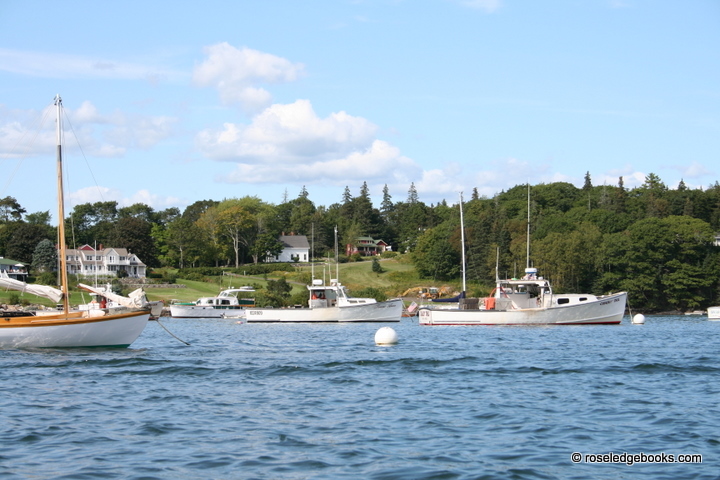A million days ago, or so it seems, I and my coffee were in Maine on the porch, overlooking kayakers and dinghy rowers cut the often still water of the morning harbor, and wondering why lobster boats and sailing boats couldn’t share the moorings I could see. That was then.
Today from my Minnesota aerie (12th floor window), I read the paper, enjoy my coffee and the big sky hovering over trees of very slowly turning colors, listen to the city sounds of sirens and traffic, and imagine the humphs and comments of fellow readers (that is you) when an interesting item appears.
**********
I loved Aaron Hirsch’s op ed piece about learning, especially in an online environment, probably because I agree with him AND it gives Roseledge Books the standing it deserves as a field resource for the forever curious who sail in and visit RB each summer to look for books and wi-fi options.
Subject matter in online courses, he notes, is chosen, presented, and evaluated by the teacher. Students have little say. Field work, on the other hand, allows students to challenge the teacher’s claims against evidence outside the teacher’s domains of classroom or computer. So Professor Hirsch argues for “hybrid online-field courses” in which the teacher chooses the online portion which then prepares the students to challenge the teacher’s claims in a museum, a nature reserve, a city neighborhood or, I would add, a bookstore. And isn’t that a good idea!
You don’t have to be a librarian (or Irish?) to love the idea of challenging ideas based on strong — if hugely varied — evidence, but maybe it helps. And won’t we all be better off when it happens more often! Know that Roseledge Books will have Aaron Hirsch’s new book, Telling Our Way to the Sea: Voyage of Discovery in the Sea`of Cortez, as soon as it is out in paperback. Until then, if Professor Hirsch and his students are ever sailing nearby, the Roseledge Books welcome mat is ready with lots of lawn chairs and arguable books.
***********
Anytime I see “obsessive quest” I am on it, especially if a book results or if the searcher is branching out into less familiar terrain. Professor Gregg Hecimovich, whose specialty is Victorian literature, intends to publish “The life and Times of Hannah Crafts,” (a slave’s novel) so both qualifications will be met, and Roseledge Books will have the forthcoming book, as soon as it s available in paperback.
The only other “obsessive quest” book that comes to mind is Roger Mitchell’s Clear Pond:A Reconstruction of a Life. A snotty NYT Book Review thought his effort unworthy, as I recall, because the subject was a man whose name was in or on so few records. Well humph, I say. I immediately bought the book in hard copy and loved poet Mitchell’s five-year search for whatever he could find about Israel Johnson. If ever the book is issued in paperback, RB will have it in a heartbeat.
***********
Oh no! It’s the messy desk vs. the tidy desk question AGAIN. I once used Harold Geneen’s point that a big glass-topped desk with one piece of paper on it indicated a person capable of only one thought at a time. (I think he was CEO of ITT then.) I used his perspective many times when program accrediters, especially nursing accrediters, came to my University office and frowned at my idea-filled desktop of assorted piles. This new research, which apparently surprised the researchers, refers more politely to the tidy desk keeper as “conscientious”, “organized”, “disciplined”, but I remain messy, unrepentent. and in their words, creative. I can only hope.
Time to get on with the day (83 degrees, very windy). Now if I could just find on my desk where I put Martin Walker’s Bruno: Chief of Police, a new mystery which might be my Roseledge Books series find for next summer.


